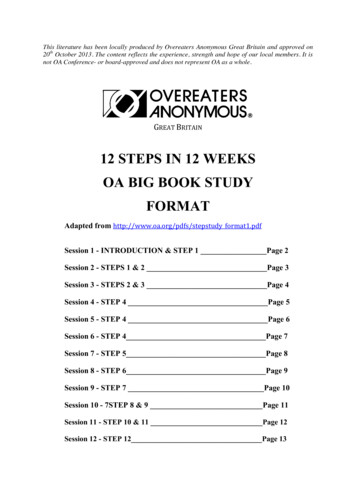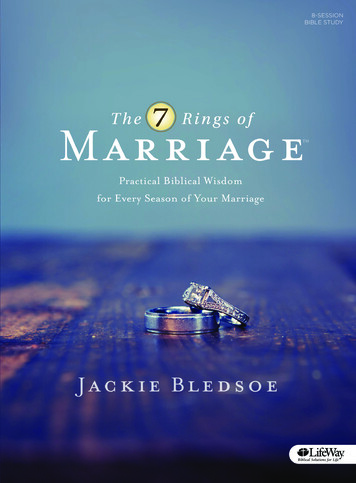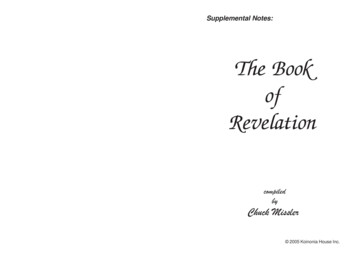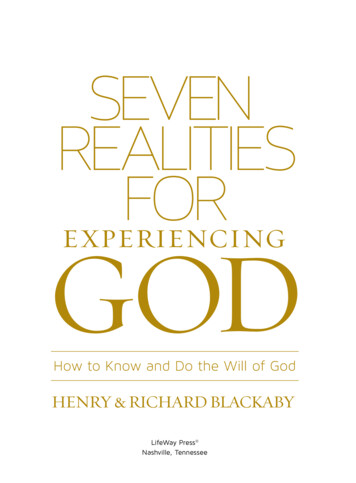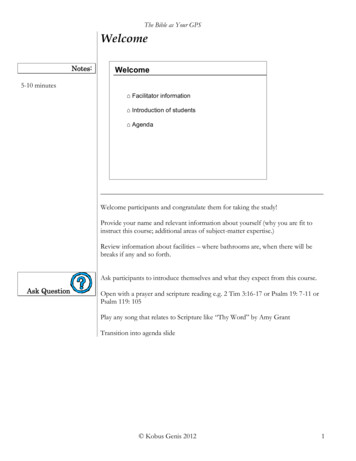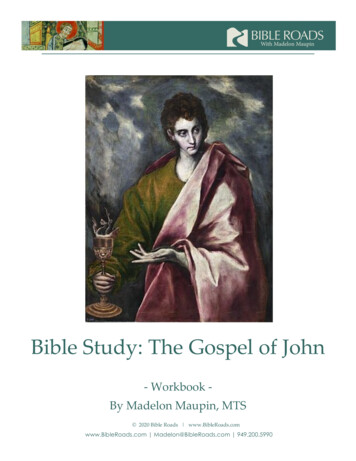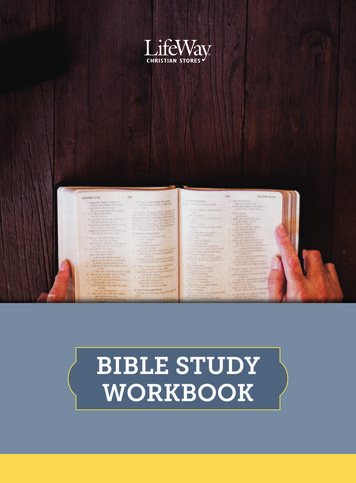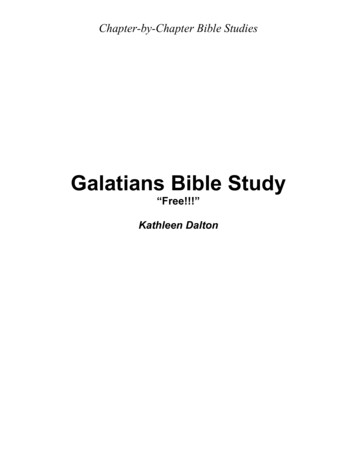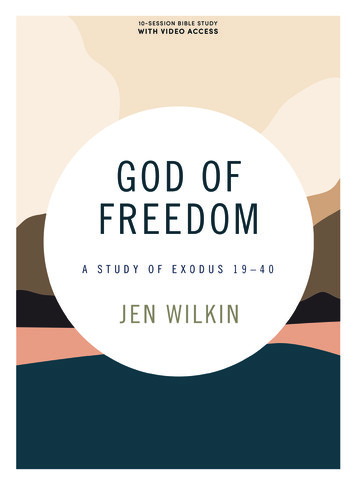
Transcription
10- S E S S I O N B I B L E ST U DYW I T H V I D EO AC C E S S
Lifeway Press Nashville, Tennessee
Published by Lifeway Press 2022 Jen WilkinEDITORIAL TEAMLIFEWAY WOMENBIBLE STUDIESBecky LoydDirector, Lifeway WomenTina BoeschManagerChelsea WaackProduction LeaderLaura MagnessContent EditorErin FranklinProduction EditorLauren ErvinGraphic DesignerAll rights reserved. No part of this work may be reproduced,stored in a retrieval system or transmitted in any form or by anymeans, electronic or mechanical, including photocopying andrecording, without express written permission of the publisher.Requests for permission should be addressed to Lifeway Press ,One Lifeway Plaza, Nashville, TN 37234-0152.ISBN: 978-1-0877-1329-8Item: 005826386Dewey Decimal Classification: 222.12Subject Headings: BIBLE. O.T. EXODUS / FREEDOM / GODUnless otherwise indicated, all Scripture quotations are fromThe ESV Bible (The Holy Bible, English Standard Version ),copyright 2001 by Crossway, a publishing ministry of GoodNews Publishers. Used by permission. All rights reserved.Scripture quotations marked (NIV) are taken from the HolyBible, New International Version , NIV Copyright 1973, 1978,1984, 2011 by Biblica, Inc.TM Used by permission of Zondervan.All rights reserved worldwide. www.zondervan.com. The “NIV”and “New International Version” are trademarks registered in theUnited States Patent and Trademark Office by Biblica, Inc. TMTo order additional copies of this resource, order online atwww.lifeway.com; write Lifeway Resources Customer Service:One Lifeway Plaza, Nashville, TN 37234-0113; fax order to615.251.5933; or call toll-free 1.800.458.2772.Author is represented by Wolgemuth & Associates, Inc.Printed in the United States of AmericaLifeway ResourcesOne Lifeway PlazaNashville, TN 37234
C ontentsABOUT THE AUTHOR5FOREWORD: HOW SHOULD WE APPROACH GOD’S WORD?6HOW TO USE THIS STUDY11WEEK ONE: INTRODUCTION A CALL TO WORSHIP14WEEK TWO: THE COVENANT DECLARED16Exodus 19–20:21WEEK THREE: THE TEN WORDS—PART 134Exodus 20:1-12WEEK FOUR: THE TEN WORDS—PART 252Exodus 20:13-17WEEK FIVE: THE BOOK OF THE COVENANT66Exodus 20:22–24:18WEEK SIX: THE SANCTUARY82Exodus 25–26; 30:1-10WEEK SEVEN: THE OUTER COURT100Exodus 27; 30:11-38WEEK EIGHT: THOSE WHO MINISTER AND BUILD116Exodus 28–29; 31WEEK NINE: FORGETFULNESS132Exodus 32–34WEEK TEN: OBEDIENCE148Exodus 35–40WRAP-UP164APPENDIX: THE ATTRIBUTES OF GOD168
4
ABOUT THE AUTHORJen Wilkin is an author and Bible teacher fromDallas, Texas. She has organized and led studiesfor women in home, church, and parachurchcontexts. Her passion is to see others becomearticulate and committed followers of Christ,with a clear understanding of why they believewhat they believe, grounded in the Word ofGod. Jen is the author of Ten Words to Live By:Delighting in and Doing What God Commands,Women of the Word, None Like Him, In His Image,and Bible studies exploring the Sermon onthe Mount and the Books of Genesis, Exodus,Hebrews, and 1 Peter. You can find her atJenWilkin.net.5
FORE WORD: HOW SHOULD WEAPPROACH GOD’S WORD?OU R P U R P O S EThe Bible study you are about to begin will teach you an important passage of theBible in a way that will stay with you for years to come. It will challenge you to movebeyond loving God with just your heart to loving Him with your mind. It will focuson answering the question, “What does the Bible say about God?” It will aid you in theworthy task of God-discovery.You see, the Bible is not a book about self-discovery; it is a book about God-discovery.The Bible is God’s declared intent to make Himself known to us. In learning about thecharacter of God in Scripture, we will experience self-discovery, but it must not be theobject of our study. The object must be God Himself.This focus changes the way we study. We look first for what a passage can teach us aboutthe character of God, allowing self-discovery to be the by-product of God-discovery.This is a much better approach because there can be no true knowledge of self apartfrom knowledge of God. So when I read the account of Jonah, I see first that God is justand faithful to His Word—He is faithful to proclaim His message to Nineveh no matterwhat. I see second that I, by contrast (and much like Jonah), am unjust to my fellowman and unfaithful to God’s Word. Thus, knowledge of God leads to true knowledgeof self, which leads to repentance and transformation. So are confirmed Paul’s words inRomans 12:2 that we are transformed by the renewing of our minds.Most of us are good at loving God with our hearts. We are good at employing ouremotions in our pursuit of God. But the God who commands us to love with the totalityof our hearts, souls, and strength also commands us to love Him with all of our minds.Because He only commands what He also enables His children to do, it must be possiblefor us to love Him well with our minds or He would not command it. I know you willbring your emotions to your study of God’s Word, and that is good and right. But it isyour mind that I am jealous for. God intends for you to be a good student, renewingyour mind and thus transforming your heart.6GOD OF FREEDOM
O U R P R OCE S SBeing a good student entails following good study habits. When we sit down to read,most of us like to read through a particular passage and then find a way to apply it toour everyday lives. We may read through an entire book of the Bible over a period oftime, or we may jump around from place to place. I want to suggest a different approach,one that may not always yield immediate application, comfort, or peace, but one thatbuilds over time a cumulative understanding of the message of Scripture.READING IN CONTEXT AND REPETITIVELYImagine yourself receiving a letter in the mail. The envelope is handwritten, but youdon’t glance at the return address. Instead you tear open the envelope, flip to the secondpage, read two paragraphs near the bottom, and set the letter aside. Knowing that ifsomeone bothered to send it to you, you should act on its contents in some way, youspend a few minutes trying to figure out how to respond to what the section you justread had to say. What are the odds you will be successful?No one would read a letter this way. But this is precisely the way many of us read ourBibles. We skip past reading the “envelope”—Who wrote this? To whom was it written?When was it written? Where was it written?—and then try to determine the purpose of itscontents from a portion of the whole. What if we took time to read the envelope? Whatif, after determining the context for its writing, we started at the beginning and read tothe end? Wouldn’t that make infinitely more sense?In our study, we will take this approach to Scripture. We will begin by placing ourtext in its historical and cultural context. We will “read the envelope.” Then we willread through the entire text so that we can better determine what it wants to say tous. We will read repetitively so that we might move through three critical stages ofunderstanding: comprehension, interpretation, and application.FOREWORD 7
STAGE 1: COMPREHENSIONRemember the reading comprehension section on the SAT? Remember those longreading passages followed by questions to test your knowledge of what you had justread? The objective was to force you to read for detail. We are going to apply thesame method to our study of God’s Word. When we read for comprehension, we askourselves, What does it say? This is hard work. A person who comprehends the account ofthe six days of creation can tell you specifically what happened on each day. This is thefirst step toward being able to interpret and apply the story of creation to our lives.STAGE 2: INTERPRETATIONWhile comprehension asks, What does it say?, interpretation asks, What does it mean?Once we have read a passage enough times to know what it says, we are ready to lookinto its meaning. A person who interprets the creation story can tell you why Godcreated in a particular order or way. She is able to imply things from the text beyondwhat it says.STAGE 3: APPLICATIONAfter doing the work to understand what the text says and what the text means, weare finally ready to ask, How should it change me? Here is where we draw on our Godcentered perspective to ask three supporting questions: What does this passage teach me about God? How does this aspect of God’s character change my view of self? What should I do in response?A person who applies the creation story can tell us that because God creates in anorderly fashion, we, too, should live well-ordered lives. Knowledge of God gleanedthrough comprehension of the text and interpretation of its meaning can now beapplied to my life in a way that challenges me to be different.SOME GUIDELINESIt is vital to the learning process that you allow yourself to move through the threestages of understanding on your own, without the aid of commentaries or study notes.The first several times you read a passage, you will probably be confused. In our studytogether, not all the homework questions will have answers that are immediately clearto you. This is actually a good thing. If you are unsure of an answer, give it your best8GOD OF FREEDOM
shot. Allow yourself to feel lost, to dwell in the “I don’t know.” It will make the moment ofdiscovery stick. We’ll also expand our understanding in the small-group discussion andteaching time.Nobody likes to feel lost or confused, but it is an important step in the acquisition andretention of understanding. Because of this, I have a few guidelines to lay out for you as yougo through this study.1. Avoid all commentaries until comprehension and interpretation have been earnestlyattempted on your own. In other words, wait to read commentaries until after youhave done the homework, attended small-group time, and listened to the teaching.And then, consult commentaries you can trust. Ask a pastor or Bible teacher at yourchurch for suggested authors. I used the following commentaries in creating this study:Exodus: An Exegetical and Theological Exposition of Holy Scripture by Douglas K. Stuart,Exodus: A Mentor Commentary by John L. Mackay, Exodus: Saved for God’s Gloryby Philip Graham Ryken, and The Message of Exodus: The Days of Our Pilgrimage byJ. A. Motyer.2. For the purposes of this study, get a Bible without study notes. Come on, it’s just tooeasy to look at them. You know I’m right.3. Though commentaries are initially off-limits, here are some tools you should use: Cross-references. These are the Scripture references in the margin or at the bottom ofthe page in your Bible. They point you to other passages that deal with the same topicor theme. A n English dictionary to look up unfamiliar words. A good online dictionary is:merriam-webster.com. O ther translations of the Bible. We will use the English Standard Version (ESV) asa starting point, but you can easily consult other versions online. I recommend theChristian Standard Bible (CSB), New International Version (NIV), New AmericanStandard Version (NASB), and New King James Version (NKJV). Reading morethan one translation can expand your understanding of the meaning of a passage.Note: a paraphrase, such as The Message, can be useful but should be regarded asa commentary rather than a translation. They are best consulted after careful study ofan actual translation. A printed copy of the text, double-spaced, so you can mark repeated words, phrases,or ideas. For certain lessons in this workbook, portions of the text will beprovided for you to mark. If you find it helpful to mark other sections of thetext, you should print them and do so.FOREWORD 9
STORING UP TREASUREApproaching God’s Word with a God-centered perspective, with context, and with caretakes effort and commitment. It is study for the long-term. Some days your study maynot move you emotionally or speak to an immediate need. You may not be able to applya passage at all. But what if ten years from now, in a dark night of the soul, that passagesuddenly opens up to you because of the work you have done today? Wouldn’t yourlong-term investment be worth it?In Matthew 13 we see Jesus begin to teach in parables. He tells seven deceptivelysimple stories that left His disciples struggling for understanding—dwelling in the“I don’t know,” if you will. After the last parable, He turns to them and asks, “Have youunderstood all these things?” (v. 51a). Despite their apparent confusion, they answerout of their earnest desire with, “Yes” (v. 51b). Jesus tells them that their newfoundunderstanding makes them “like the owner of a house who brings out of his storeroomnew treasures as well as old” (v. 52, NIV).A storeroom, as Jesus indicated, is a place for keeping valuables over a long periodof time for use when needed. Faithful study of God’s Word is a means for filling ourspiritual storerooms with truth, so that in our hour of need we can bring forth both theold and the new as a source of rich provision. I pray that this study would be for youa source of much treasure and that you would labor well to obtain it.Grace and peace,Jen Wilkin10GOD OF FREEDOM
HOW TO USE THIS STUDYThis workbook is designed to be used in a specific way. The homework in theworkbook will start you in the process of comprehension, interpretation, andapplication. However, it was designed to dovetail with small-group discussion timeand the video teaching sessions. You can use the workbook by itself, but you arelikely to find yourself with some unresolved questions. The video teaching sessionsare intended to resolve most, if not all, of your unanswered questions from thehomework and discussion time. You’ll find detailed information for how to accessthe video teaching sessions that accompany this study on the card inserted in theback of your workbook. With this in mind, consider using the materials as follows: I f you are going through the study on your own, first work through thehomework, and then watch the corresponding video teaching for that week. I f you are going through the study in a group, first do your homework, and thendiscuss the questions your group decides to cover. Then watch or listen to thevideo teaching. Some groups watch the teaching before they meet, which can alsowork if that format fits best for everyone.Note: For Week One, there is no homework. The study begins with a videointroduction. You will find a Viewer Guide on pages 14–15 that you can use as youwatch the introductory material.You’ll find detailed information for how to access the videoteaching sessions that accompany this study on the cardinserted in the back of your workbook.HOW TO USE THIS STUDY 11
HOW TO USE THE LE ADER GUIDEAt the end of each week’s homework you will find a leader guide intended to helpfacilitate discussion in small groups. The leader guide includes questions to helpgroup members compare what they have learned from their homework. Thesequestions are either pulled directly from the homework, or they summarizea concept or theme that the homework covered. Each section covers content froma particular day of the homework, first asking group members to observe and thenasking them to apply. The observation questions typically ask group members toreport a finding or flesh out an interpretation. The application questions challengethem to move beyond intellectual understanding and to identify ways to livedifferently in light of what they have learned.As a small group leader, you will want to review these questions before you meetwith your group, thinking through your own answers, marking where they occur inthe homework, and noting if there are any additional questions you might want toreference to help the flow of the discussion. These questions are suggestions only,intended to help you cover as much ground as you can in a 45-minute discussiontime. They should not be seen as requirements or limitations, but as guidelinesto help you prepare your group for the teaching time by allowing them to processcollectively what they have learned during their homework.As a facilitator of discussion rather than a teacher, you are allowed and encouragedto be a colearner with your group members. This means you yourself may notalways feel confident of your answer to a given question, and that is perfectly OK.Because we are studying for the long-term, we are allowed to leave some questionspartially answered or unresolved, trusting for clarity at a later time. In most cases,the video teaching time should address any lingering questions that are not resolvedin the homework or the small-group discussion time.ACKNOWLEDGMENTOnce again, I am deeply grateful to Jenni Hamm for her editorial help on this study.Her insights, attention to detail, and love for the Lord and His Word have beenindispensable to me. “Let her works praise her in the gates” (Prov. 31:31).12GOD OF FREEDOM
NOTES 13
WEEK ONE VIEWER GUIDE NOTESIntroduction A Call to WorshipWho wrote the Book of Exodus?When was it written?To whom was it written?14GOD OF FREEDOM
To access thevideo teachingsessions, use theinstructions inthe back of yourworkbook.In what style was it written?What is the central theme of the book?#GodOfFreedomStudyWEEK ONE: INTRODUCTION 15
WEEK T WO:TheCovenantDeclaredExodus 19–20:2116
Throughout the plagues on Egypt, God madeclear His intent for His people to be set freeso that they might worship Him. At last,having arrived at Mount Sinai, the time hascome for the newly-birthed nation of Israelto learn how her God is to be approachedin worship.17
DAY ONEREAD EXODUS 19–20:21.1.Summarize chapter 19 in two to three sentences.2.Summarize chapter 20:1-21 in two to three sentences.3. The map on the opposite page shows a commonly proposed map of theexodus route. Mark the following:18 Circle Mount Sinai. Highlight the path the Israelites have taken thus far in theirjourney out of Egypt (from Goshen to Mount Sinai). Circle the location of Canaan (the promised land) in the upperright-hand corner of the map between the Great Sea and theDead Sea.GOD OF FREEDOM
NACA GazaMigdolTanis, Zoan EGYPTPithom? Wildernessof Shur GOSHENWildernessof EthamMigdol Heliopolis, On Etham? EDOMNile River Elath Marah?Elim?oGulff SuRedez (Rephidim? Hazeroth? a ( Red Sea) Aqab a)SeMt. Sinai PunonWildernessof ParanPi-hahiroth?Herakleopolis Kadesh BarneaHazar AddarMO A BWildernessof ZinMt. Hor?lf of Brook ofEgyptMt. NeboLA N DOFMIDIANGuNile Delta Hebron AradBeersheba SakhaMemphisJerusalemDead SeaANMedit er r anean Sea( Gr eat Sea)Beni HasanHermopolisRed Sea week two: The Covenant Declared19
NOW LOOK BACK AT EXODUS 19:1-9.4.Forty-five days have passed since Passover and the exodus. Look back atExodus 3:12. What promise did God make to Moses that is now about tobe fulfilled?5. In 19:3-6, God tells Moses what to say to the people of Israel regarding thecovenant He will make with them, which will become known as the MosaicCovenant. What is to be Israel’s motivation for committing to the covenant (v. 4)? What are the requirements of the covenant (v. 5a)? What are the privileges of the covenant (vv. 5b-6)?6. Why does God promise Israel will be a “treasured possession” versusa possessor of treasures (v. 5)? What is the difference?7.Why does God promise Israel will be a “kingdom of priests” versus a familyof priests or a community of priests (v. 6)? What is the difference?8. Why does God promise Israel will be a “holy nation” versus a great nation(v. 6)? What is the difference?20GOD OF FREEDOM
9.Look up 1 Peter 2:9-10. Peter addresses both Jews and non-Jews in theseverses. Why does he use the description he does? What does he want theseNew Testament believers to understand about their relationship to God andHis promises to Israel?10. How do the Israelites respond when Moses tells them the words the Lordgave him to speak (Ex. 19:7-8)?11. APPLY: When entering into a solemn agreement, why do we say “I do” or“I will” rather than “I’ll try my hardest” or “I’ll give it my best shot”?Have you ever hesitated to give your full verbal commitment to a keyrelationship because the requirements seemed too difficult? Is it sinful tocommit verbally to a covenant we have no chance of fulfilling perfectly?Why or why not?week two: The Covenant Declared21
DAY TWONOW LOOK AT EXODUS 19:10-15.12. What is Moses told to do in verse 10?“Go to the people and them today and tomorrow” (ESV).Look up the word you wrote above in a dictionary or thesaurus. Writea definition for it that best fits the context of the verse.13. What instructions are given to the people to prepare them for their encounterwith God? Note Moses’ instructions with regard to:Clothing (vv. 10,14)Where they can and can’t go (vv. 12-13)What activities they are to avoid (v. 15)14. Why would God give such specific instructions for how He is to beapproached? How would wearing clean clothes, refraining from sexual activity,and keeping a safe distance impact the way the Israelites perceive theirencounter with God?15. APPLY: Does God no longer care about how we approach Him because of theblood of Christ? Explain your answer.How are we sometimes guilty of approaching worship in a casual manner?22GOD OF FREEDOM
DAY THREENOW LOOK AT EXODUS 19:16-25.16. Describe in your own words the scene on the morning of the third day atMount Sinai. Which of the five senses would have been impacted by thecircumstances described?17. How do the people respond to God’s physical appearance before them(vv. 16-18)?18. What do you think God intends to communicate to the people through thisdisplay of His power? Why not choose a softer approach?19. APPLY: Think of a time when God’s power was displayed for you in a waythat made you tremble. Write about it below. Why is standing in awe of andtrembling before God’s power good for His children?week two: The Covenant Declared23
DAY FOURNOW LOOK AT EXODUS 20:1-17.We will spend the next two weeks looking at the Ten Commandments in closerdetail. This week we will look at them from the standpoint of their role within theMosaic Covenant.The Mosaic Covenant follows the standard pattern of sovereign-vassal treaties (orsuzerain-vassal treaties) common in the ancient Near East. A suzerain-vassal treaty wasa formal agreement entered into by a lord and his servant. These covenants followed thefollowing pattern:1. Introduction of the sovereign by his royal title(s);2. Historical prologue, outlining the history of the relationship between the two parties;3. General requirements of the agreement;4. Specific requirements of the agreement.20. In the left-hand margin next to each of the treaty elements above, note whichverse(s) in Exodus 20:1-17 represent each of the first three elements. Thefourth element (specific requirements) is detailed in 20:23–23:33 and willbe covered in Week Five of our study.24GOD OF FREEDOM
21. As you read through each of the Ten Commandments, note in the chartprovided what they tell you about the character of God. What does He value?What does He hate?COMMANDMENT1Have no othergods before Him.2Don’t make carvedimages.3Don’t take theLord’s name in vain.4Keep theSabbath holy.5Honor your fatherand mother.6Don’t murder.7Don’t commitadultery.8Don’t steal.9Don’t bearfalse witness.10CHAR ACTERTR AIT OF GODWHAT GODVA L U E SWHAT GODH ATESDon’t covet.week two: The Covenant Declared25
22. What relationship is protected in commandments 1-4?23. What relationship is protected in commandments 5-10?24. Look up Matthew 22:34-40. When asked which command was the mostimportant, does Jesus respond with any of the Ten Commandments? Explainyour answer.25. APPLY: Our relationships with others are always tied to our relationshipwith God. Think of a person you currently find hard to love. How is yourunwillingness or inability to love that person an indicator of a deficit in yourlove for God?26GOD OF FREEDOM
DAY FIVENOW LOOK AT EXODUS 20:18-21.26. What do the people fear will happen to them if Moses does not act as theirintermediary (v. 19)? Is their fear justified? Why or why not?27. How would you paraphrase Moses’ words in verse 20? What does he wantthe people to understand about fear?28. We think of fear as an undesirable thing. Look up the following verses andnote what desirable things accompany a fear of the Lord:Psalm 25:14Psalm 86:11Psalm 111:10Proverbs 3:7Proverbs 8:13Ecclesiastes 12:1329. APPLY: Christians live in the tension between trembling at God’s power anddrawing near to Him as our Abba Father. What potential danger is there inover-emphasizing one of these truths at the expense of the other?Is your own approach to God unbalanced by either being overly fearful oroverly familiar? How can you return to a more balanced view of God?week two: The Covenant Declared27
WRAP-UPWhat aspect of God’s character has this week’s passage of Exodus shownyou more clearly? (Note: Each week we will end our homework by focusing onwhat the text has revealed about God. A list of God’s attributes can be foundin the back of your workbook on pages 168–169 to help you think throughyour answer to the wrap-up questions.)Fill in the following statement:Knowing that G o d is shows methat I am .What one step can you take this week to better live in light of this truth?28GOD OF FREEDOM
NOTESweek two: The Covenant Declared29
WEEK TWO GROUP DISCUSSION1. OBSERVE: (question 9, p. 21) Look up 1 Peter 2:9-10. Peter addresses bothJews and non-Jews in these verses. Why does he use the description he does?What does he want these New Testament believers to understand about theirrelationship to God and His promises to Israel?A PPLY: (question 11, p. 21) When entering into a solemn agreement, why dowe say “I do” or “I will” rather than “I’ll try my hardest” or “I’ll give it mybest shot”?Have you ever hesitated to give your full verbal commitment to a keyrelationship because the requirements seemed too difficult? Is it sinful tocommit verbally to a covenant we have no chance of fulfilling perfectly? Whyor why not?2. OBSERVE: (question 14, p. 22) Why would God give such specific instructionsfor how He is to be approached? How would wearing clean clothes, refrainingfrom sexual activity, and keeping a safe distance impact the way theIsraelites perceive their encounter with God?A PPLY: (question 15, p. 22) Does God no longer care about how we approachHim because of the blood of Christ? Explain your answer.How are we sometimes guilty of approaching worship in a casual manner?3. OBSERVE: (question 17, p. 23) How do the people respond to God’s physicalappearance before them (Ex. 19:16-18)?A PPLY: (question 19, p. 23) Think of a time when God’s power was displayedfor you in a way that made you tremble. Why is standing in awe of andtrembling before God’s power good for His children?30GOD OF FREEDOM
4. OBSERVE: (question 24, p. 26) Look up Matthew 22:34-40. When askedwhich command was the most important, does Jesus respond with any of theTen Commandments? Explain your answer.A PPLY: (question 25, p. 26) Our relationships with others are always tiedto our relationship with God. Think of a person you currently find hard tolove. How is your unwillingness or inability to love that person an indicator ofa deficit in your love for God?5. OBSERVE: (question 26, p. 27) What do the people fear will happen tothem if Moses does not act as their intermediary (Ex. 20:19)? Is their fearjustified? Why or why not?A PPLY: (question 29, p. 27) Christians live in the tension between tremblingat God’s power and drawing near to Him as our Abba Father. What potentialdanger is there in over-emphasizing one of these truths at the expense ofthe other?Is your own approach to God unbalanced by either being overly fearful oroverly familiar? How can you return to a more balanced view of God?6. W RAP-UP: (p. 28) What aspect of God’s character has this week’s passageof Exodus shown you more clearly?Fill in the following statement:Knowing that G o d is shows me thatI am .What one step can you take this week to better live in light of this truth?week two: The Covenant Declared31
WEEK TWO VIEWER GUIDE NOTES32GOD OF FREEDOMTo access the video teaching sessions, use theinstructions in the back of your workbook.
#GodOfFreedomStudyweek two: The Covenant Declared33
The Bible study you are about to begin will teach you an important passage of the Bible in a way that will stay with you for years to come. It will challenge you to move beyond loving God with just your heart to loving Him with your mind. It will focus on answering the question, “What does the


